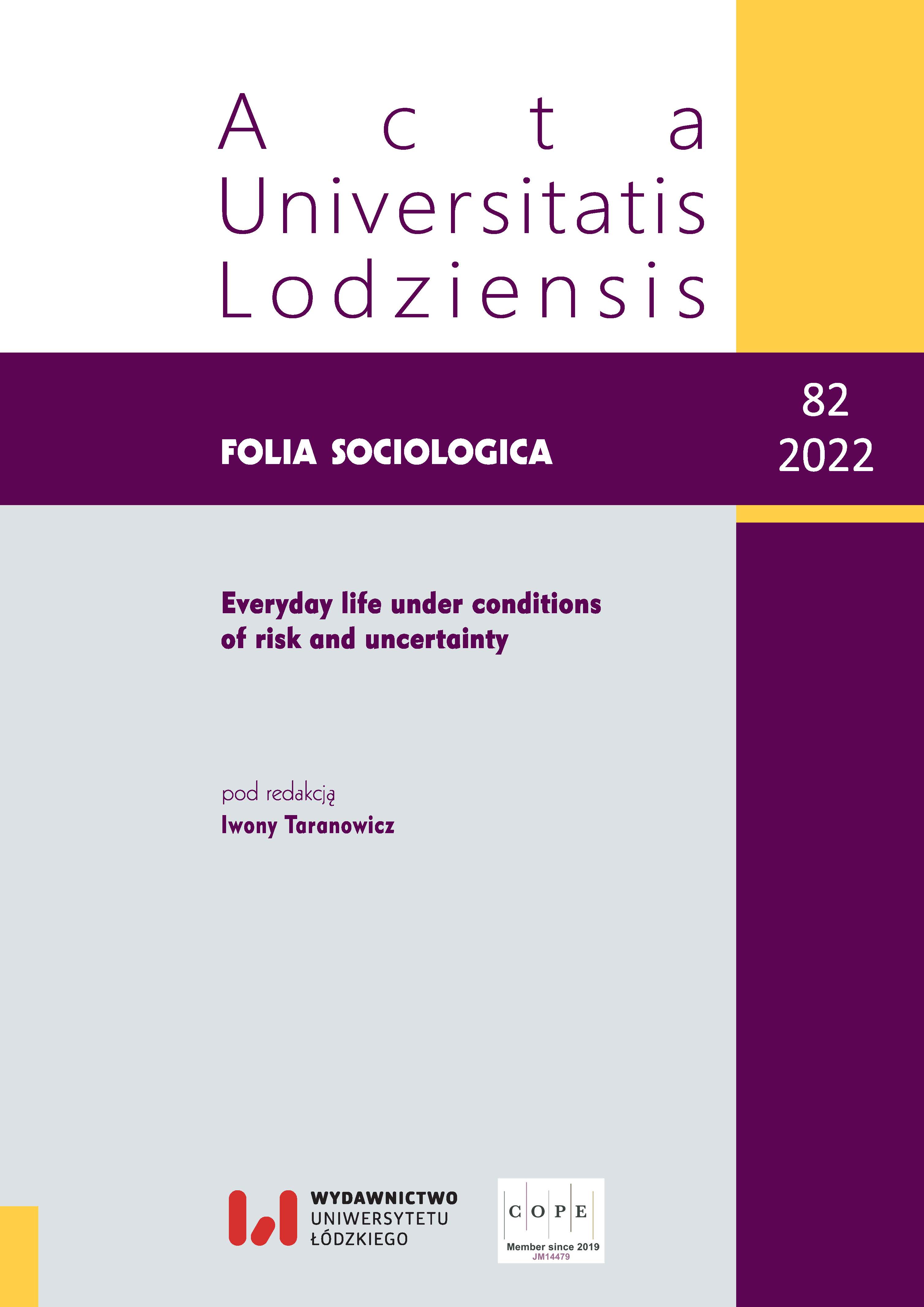Children and Young People as Stakeholders in Revitalisation. The Example of the Revitalisation Programme of Lodz 2026+
DOI:
https://doi.org/10.18778/0208-600X.82.07Keywords:
children, youth, revitalization, new childhood studiesAbstract
The aim of the article is to answer the question about how children and youth as inhabitants and users of urban spacer are represented in a document setting a frame for the process of city renewal. Theoretical background for my investigation is the concept of childhood developed within the area of new interdisciplinary childhood studies. I apply a qualitative content analysis approach to work with the text of Revitalization Programme of the City of Łodz 2026+, which is an example of a document setting framework for a complex revitalization venture. The analysis shows that in the Local Revitalization Program children and youth are presented as passive community members, potential clients of helping institutions, and the “carriers” of social problems. The document refers to traditional, socialization-based concept of childhood perceived as a gradual process of becoming a fully-formed and valuable, i.e. adult, person. Children and youth are treated as future employees who need to become equipped with proper skills and competences necessary to participate in the labor market, and who are expected to contribute to the future success and development of the city. The document does not refer to current children’s needs and their wellbeing “here and now”.
References
Berg van den M. (2013), City Children and Genderfied Neighbourhoods: The New Generation as Urban Regeneration Strategy, „International Journal of Urban and Regional Research”, nr 37(2), s. 523–536 https://doi.org/10.1111/j.1468-2427.2012.01172.x
Google Scholar
DOI: https://doi.org/10.1111/j.1468-2427.2012.01172.x
Brzozowska-Brywczyńska M. (2013), Partycypacja publiczna dzieci, „Analizy i opinie”, numer specjalny 4, marzec, Instytut Spraw Publicznych, s. 1–28.
Google Scholar
Brzozowska-Brywczyńska M. (2014), Dziecięce obywatelstwo: kilka refleksji na marginesie dziecięcej partycypacji, „Acta Universitatis Lodziensis. Folia Sociologica”, nr 49, s. 11–27.
Google Scholar
Ciarkowski B. (2016), Łódź, która nie powstała, Księży Młyn Dom Wydawniczy, Łódź.
Google Scholar
Corsaro W.A. (2015), The Sociology of Childhood. Fourth Edition, Sage, London–Thousand Oaks–New Delhi–Singapore.
Google Scholar
Gabriel N. (2017), The Sociology of Early Childhood. Critical Perspectives, Sage, London–Thousand Oaks–New Delhi–Singapore https://doi.org/10.4135/9781473982918
Google Scholar
DOI: https://doi.org/10.4135/9781473982918
Główny Urząd Statystyczny (GUS) 2019, Rocznik Statystyczny Rzeczpospolitej Polskiej 2019, Warszawa.
Google Scholar
Gryglewski P., Wróbel R., Ucińska A. (2009), Łódzkie budynki 1945–1970, Księży Młyn Dom Wydawniczy, Łódź.
Google Scholar
James A., James A. (2012), Key concepts in Childhood Studies. Second Edition, Sage, London–Thousand Oaks–New Delhi–Singapore https://doi.org/10.4135/9781526435613
Google Scholar
DOI: https://doi.org/10.4135/9781526435613
Jenks Ch. (2008), Socjologiczne konstrukty dzieciństwa, [w:] M.J. Kehily (red.), Wprowadzenie do badań nad dzieciństwem, przeł. M. Kościelniak, Wydawnictwo WAM, Kraków, s. 111–133.
Google Scholar
Karta Lipska na rzecz zrównoważonego rozwoju miast europejskich (2007) http://www.sarp.org.pl/pliki/karta_lipska_pl.pdf (dostęp: 12.05.2022).
Google Scholar
Ljubljana Agreement. Urban Agenda for the EU – the Next Generation (Porozumienie z Ljubljany) (2022) https://eurocities.eu/wp-content/uploads/2022/01/Ljubljana-Agreement.pdf (dostęp: 12.05.2022).
Google Scholar
Mergel L., Pobłocki K., Wudarski M. (2013), Anty-bezradnik przestrzenny – prawo do miasta w działaniu, Biblioteka Res Publiki Nowej, Warszawa.
Google Scholar
Nowa Agenda Miejska. Deklaracja z Quito w sprawie zrównoważonych miast i osiedli ludzkich dla wszystkich (2016), United Nations https://urbact.eu/sites/default/files/nua_polish_lr-final.pdf (dostęp: 30.06.2020).
Google Scholar
Nowa Karta Lipska. Transformacyjna siła miast na rzecz wspólnego dobra (2020) http://www.miasta.pl/uploads/statute/content_file/233/Karta_Lipska_-_t_umaczenie_PL.pdf (dostęp: 15.05.2021).
Google Scholar
Palska H. (1999), Badacz społeczny wobec tekstu, [w:] H. Domański, K. Lutyńska, A.W. Rostocki (red.), Spojrzenie na metodę. Studia z metodologii badań socjologicznych, Wydawnictwo Instytutu Filozofii i Socjologii PAN, Warszawa, s. 161–176.
Google Scholar
Program Rewitalizacji Łodzi 2026+ (PRŁ 2026+) (2016) https://rewitalizacja.uml.lodz.pl/files/public/PORTAL_REWITALIZACJA/GPR/Uchwala_ws._przyjecia_Gminnego_Programu_Rewitalizacji_28.09.2016_pdf (dostęp: 18.07.2020).
Google Scholar
Program Rewitalizacji Łodzi 2026+ (PRŁ 2026+) (2018) https://rewitalizacja.uml.lodz.pl/files/public/PORTAL_REWITALIZACJA/GPR/1980.pdf (dostęp: 18.07.2020).
Google Scholar
Program Rewitalizacji Łodzi 2026+ (PRŁ 2026+) (2020) https://rewitalizacja.uml.lodz.pl/files/public/PORTAL_REWITALIZACJA/GPR/08_1122.pdf (dostęp: 20.04.2022).
Google Scholar
Rogatka K. (2019), Rewitalizacja i gentryfikacja w wymiarze społecznym, Wydawnictwo Naukowe Uniwersytetu im. Mikołaja Kopernika, Toruń.
Google Scholar
Silverman D. (2008), Prowadzenie badań jakościowych, tłum. J. Ostrowska, Wydawnictwo Naukowe PWN, Warszawa.
Google Scholar
Szczepaniak K. (2012), Zastosowanie analizy treści w badaniach artykułów prasowych – refleksje metodologiczne, „Acta Universitatis Lodziensis. Folia Sociologica”, nr 42, s. 83–112.
Google Scholar
Tomanek K., Bryda G. (2015), Odkrywanie postaw dydaktyków zawartych w komentarzach studenckich, „Przegląd Socjologiczny”, t. LXIV/4, s. 51–82.
Google Scholar
Zdanowicz-Kucharczyk K. (2015), Nowy paradygmat w socjologii dzieciństwa według A. James i A. Prout, [w:] D. Waloszek (red.), Encyklopedia dzieciństwa http://encyklopediadziecinstwa.pl/index.php/Nowy_paradygmat_w_socjologii_dzieci%C5%84stwa_wed%C5%82ug_A._James_i_A._Prout (dostęp: 15.05.2022).
Google Scholar
http://centrumwiedzy.org/ (dostęp: 8.07.2020).
Google Scholar
http://www.uml.lodz.pl/rewitalizacja/konsultacje_spoleczne_dotyczace_projektu_uchwaly_w_sprawie_wyznaczenia_obszaru_zdegradowanego_i_obszaru_rewitalizacji/ (dostęp: 5.07.2020).
Google Scholar
https://childfriendlycities.org/what-is-a-child-friendly-city (dostęp: 16.08.2020).
Google Scholar
https://www.childinthecity.org/2020/06/12/slovak-city-challenges-children-to-model-the-city-inminecraft/(dostęp: 10.07.2020).
Google Scholar
https://www.unicef.pl/Miasto-przyjazne-dzieciom/Miasto-przyjazne-dzieciom (dostęp: 16.08.2020).
Google Scholar
Downloads
Published
How to Cite
Issue
Section
License

This work is licensed under a Creative Commons Attribution-NonCommercial-NoDerivatives 4.0 International License.










